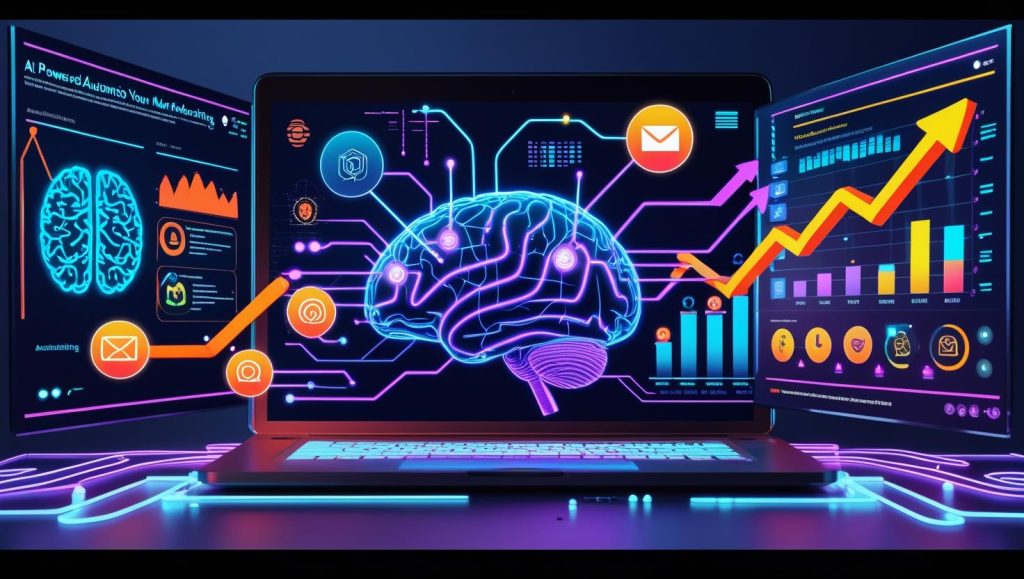What if you could eliminate your most time-consuming tasks, skyrocket your productivity, and unlock unstoppable growth all without adding extra hours to your day? AI automation makes this a reality. As businesses race to stay competitive, integrating artificial intelligence into everyday processes has become a true game-changer. In this comprehensive guide, you’ll discover how AI automation can transform your workflow, boost efficiency, and drive unprecedented success. Ready to learn how to harness this powerful technology and automate your path to success? Let’s dive in!
What is Ai automation and why it’s a game-changer?
Imagine if your daily repetitive tasks could be handled automatically while you focus on what truly matters strategizing, creating, and innovating. That’s exactly what AI automation promises. At its core, AI automation combines the power of artificial intelligence with automated workflows to perform tasks that typically require human intervention, but faster and often more accurately.
Unlike traditional automation, which follows strict, pre-programmed rules, AI automation learns from data patterns, adapts to new information, and makes decisions in real time. This means your business processes become smarter, not just faster. From sorting emails to analyzing sales trends and even generating reports, AI automation acts like a digital assistant that never sleeps.
“AI automation isn’t just about replacing human effort; it’s about enhancing human potential by offloading mundane tasks.” Tech Expert
This evolution is a game-changer because it shifts the way we work, freeing us from manual chores and empowering us to concentrate on higher-value activities. Whether you’re a solo entrepreneur or part of a large enterprise, integrating AI automation into your workflows can unlock unprecedented productivity and scalability.
How Ai automation revolutionizes business productivity?
Have you ever felt overwhelmed by the number of small tasks that pile up every day? AI automation can swoop in like a superhero to rescue your time and energy. Businesses today are harnessing AI-driven automation to streamline operations, reduce errors, and increase overall efficiency.
Here’s how AI automation is revolutionizing productivity:
- Speeding up routine processes: Tasks like data entry, invoice processing, and customer follow-ups can be completed in seconds rather than hours.
- Reducing human errors: AI’s precision drastically cuts down mistakes common in manual tasks.
- Providing real-time analytics: AI tools analyze data continuously, giving businesses instant insights to make smarter decisions.
- Personalizing customer experience: AI automation allows for tailored marketing messages and services, improving engagement and loyalty.
By automating low-value, repetitive tasks, companies empower their teams to focus on creative problem-solving and strategy. This shift leads to a more motivated workforce and better business outcomes. In fact, studies show companies that embrace AI automation experience a 30% or more increase in productivity.
How Ai workflow automation transforms business operations?
Let’s dive deeper into one of the most impactful areas: workflow automation powered by AI. Workflows are the series of steps that move tasks from start to finish within a business process. Automating these workflows ensures that information flows seamlessly, deadlines are met, and manual handoffs are minimized.
AI takes workflow automation to the next level by incorporating decision-making abilities and adaptability. Instead of rigid, rule-based sequences, AI-driven workflows can respond dynamically to changing conditions, making operations more flexible and efficient.
Common workflows transformed by AI automation include:
- Customer onboarding and support ticket management
- Invoice and payment processing
- Lead qualification and nurturing in sales pipelines
- Employee recruitment and training processes
Automating these processes with AI not only saves time but also reduces bottlenecks caused by human delays or errors. For example, an AI-powered system can instantly route support tickets to the best-suited team member based on ticket type and workload, ensuring faster resolution.
“AI workflow automation turns complicated, multi-step processes into seamless, hands-off operations that scale effortlessly.” Industry Analyst
By adopting AI workflow automation, businesses can achieve higher operational agility, allowing them to adapt quickly to market changes and customer demands.
Zapier AI : The no-code powerhouse for workflow automation
If you’re looking for an easy way to automate workflows without writing a single line of code, Zapier AI is a popular choice. Zapier connects thousands of apps like Gmail, Slack, Trello, and more allowing you to create “Zaps” that automate repetitive tasks across platforms.
What makes Zapier special is its AI-powered suggestions that help you build smarter automation workflows faster. Instead of manually setting up each trigger and action, Zapier’s AI can recommend workflow improvements or identify automation opportunities you might miss.
For example, you can set up a Zap that automatically creates a task in your project management tool every time you receive an email with a specific keyword. This cuts down on manual task creation and ensures nothing falls through the cracks.
Make (Integromat): Visual automation for complex business processes
Make (formerly Integromat) offers a more visual and advanced approach to AI workflow automation. Its drag-and-drop interface lets you design multi-step, conditional workflows that can include data transformations, loops, and error handlers.
Make also integrates AI-powered modules such as text analysis, image recognition, and natural language processing, making it perfect for automating complex processes that require decision-making or data extraction.
For instance, an e-commerce store can use Make to automatically process orders, update inventory, send personalized emails, and generate sales reports all in one seamless workflow.
Pipedream: Developer-focused Ai automation platform
For those comfortable with coding, Pipedream offers a powerful AI automation platform tailored for developers. It supports JavaScript and Python to build serverless workflows that can integrate APIs, AI services, and databases.
Pipedream excels in enabling customized automation solutions, like predictive analytics or real-time monitoring, where off-the-shelf tools fall short.
Developers use Pipedream to connect AI models for natural language processing or image recognition directly into their business workflows, enabling intelligent automation with maximum flexibility.
Boost your marketing with Ai-powered automation
Marketing is one of the most competitive and fast-paced business functions. AI automation is reshaping marketing by personalizing campaigns, segmenting audiences, and optimizing ad spend often in real time.
Traditional marketing workflows can be slow and labor-intensive, but AI tools speed up every step from lead generation to customer retention.
- Personalized email campaigns: AI segments your audience based on behavior and preferences, then crafts tailored messages.
- Automated social media management: Scheduling, posting, and engagement tracking happen without manual input.
- Predictive analytics: AI forecasts customer behavior to help you target the right prospects at the right time.
With AI-powered marketing automation, you reach customers with the right message, through the right channel, at the perfect moment maximizing conversions and ROI.
ActiveCampaign AI: Smart CRM and marketing automation
ActiveCampaign AI combines customer relationship management (CRM) with AI-powered marketing automation. It helps businesses automate email campaigns, score leads, and personalize customer journeys.
The AI features analyze customer interactions and predict the best next steps, enabling marketers to nurture leads without lifting a finger.
HubSpot AI: Ai-driven all-in-one marketing suite
HubSpot AI offers an integrated marketing platform with AI capabilities like content strategy, SEO recommendations, and chatbots. It automates routine marketing tasks while providing insights to improve campaign performance.
GetResponse AI: Ai-based email marketing & campaign generator
GetResponse AI specializes in creating email marketing campaigns automatically. Its AI engine writes subject lines, designs email templates, and optimizes send times based on user engagement data.
Data automation with Ai: Clean, sync, and analyze effortlessly
Data is the lifeblood of any business, but managing it can be a headache. AI-powered data automation tools help clean, synchronize, and analyze large datasets without manual intervention.
This automation accelerates decision-making and improves accuracy by ensuring that your data is always up-to-date and actionable.
- Data cleaning: AI identifies duplicates, fills missing values, and flags inconsistencies.
- Data syncing: Automatically updates databases across platforms in real time.
- Data analysis: Generates reports and uncovers trends without human bias or delay.
By automating data processes, companies reduce errors and free analysts to focus on interpreting insights rather than wrangling spreadsheets.
Supermetrics: Ai automate your marketing data collection
Supermetrics AI pulls data from various marketing platforms into one place, automating reporting and visualization. It saves marketers hours spent on manual data gathering and report building.
Akkio: No-code predictive Ai for data automation
Akkio offers no-code tools to create predictive models that automate forecasting and decision-making. Its AI learns from your data and provides actionable predictions, such as sales forecasts or customer churn risk.
Mozart Data: Modern data warehouse with automated pipelines
Mozart Data simplifies building data pipelines and warehouses, enabling businesses to centralize data storage and automate integration across multiple sources with ease.
Common challenges when implementing Ai automation
While AI automation offers incredible benefits, it’s not without its hurdles. Many businesses face common challenges when trying to integrate AI automation effectively:
- Complexity of integration: Connecting AI tools with existing systems can be tricky and requires technical expertise.
- Data quality issues: AI relies heavily on good data. Inaccurate or incomplete data can lead to poor automation outcomes.
- Employee resistance: Staff may fear job loss or resist change, slowing adoption of AI automation.
- Security and privacy concerns: Automating sensitive data processes demands rigorous security measures.
- Cost considerations: Initial setup and ongoing maintenance can be costly for smaller businesses.
Understanding these obstacles upfront can help you plan better and set realistic expectations for your AI automation journey.
Expert tips to overcome Ai automation challenges
Successful AI automation implementation requires more than just technology it calls for smart strategies and a clear roadmap. Here are expert tips to navigate the challenges:
- Start small and scale: Begin with automating simple tasks and gradually expand as your team gains confidence.
- Invest in quality data: Clean, structured data is the foundation of effective AI automation.
- Educate and involve your team: Transparent communication and training ease resistance and build enthusiasm.
- Prioritize security: Implement strong encryption, access controls, and compliance checks.
- Choose scalable tools: Select AI automation platforms that can grow with your business.
“Don’t just deploy AI automation nurture it like a living system that evolves and improves over time.” AI Strategist
Real-world case studies of Ai automation success
Let’s look at real companies that have transformed their productivity with AI automation:
Case study 1: E-commerce brand boosts order fulfillment
A mid-sized e-commerce business struggled with manual order processing, causing delays and customer dissatisfaction. By implementing AI-powered workflow automation with Make (Integromat), they automated order confirmation, inventory updates, and shipment tracking.
Results included a 40% reduction in processing time and a 25% increase in on-time deliveries, significantly improving customer experience and retention.
Case study 2: Marketing agency enhances campaign effectiveness
A digital marketing agency used ActiveCampaign AI to automate email marketing and lead nurturing. The AI analyzed customer behavior to deliver personalized messages and optimized send times.
The agency saw a 50% boost in email open rates and a 35% increase in conversions, proving the power of AI automation in marketing.
Case study 3: Data-driven SaaS company streamlines analytics
A SaaS company faced challenges managing vast amounts of user data. By integrating Supermetrics AI for automated data collection and reporting, their analysts saved hundreds of hours monthly.
This enabled faster decision-making and more accurate insights, driving a 20% increase in customer satisfaction scores.
How to choose the right Ai automation tools for your business?
With so many AI automation tools on the market, picking the right ones can feel overwhelming. Here are key criteria to consider:
- Compatibility: Does the tool integrate smoothly with your existing systems and software?
- Ease of use: Is the platform user-friendly and accessible for your team?
- Scalability: Can the tool grow with your business needs?
- AI capabilities: Does it offer advanced AI features like natural language processing or predictive analytics?
- Support and community: Is customer support reliable? Are there resources and forums for troubleshooting?
- Pricing: Does the cost fit your budget without compromising essential features?
Future trends in Ai automation you need to watch
The AI automation landscape is evolving rapidly. Staying ahead means keeping an eye on emerging trends:
- Hyperautomation: Combining AI, machine learning, and robotic process automation (RPA) for end-to-end automation.
- AI-driven decision-making: Automation systems will increasingly make complex business decisions autonomously.
- Conversational AI and chatbots: Enhanced natural language understanding will make interactions more human-like.
- Edge AI: AI processing at the device level for faster, real-time automation without cloud dependency.
- Ethical AI automation: Growing emphasis on transparency, fairness, and data privacy in AI systems.
Maximizing ROI with Ai automation: Strategies that work
To get the best return on investment from AI automation, follow these strategies:
- Define clear objectives: Know what success looks like and measure progress with KPIs.
- Align automation with business goals: Focus on processes that directly impact revenue, costs, or customer satisfaction.
- Monitor and optimize: Continuously review automated workflows and fine-tune AI models.
- Train your workforce: Equip employees with skills to work alongside AI and manage automated systems.
- Leverage analytics: Use AI insights to identify new automation opportunities and strategic improvements.
Ai automation ethics: What you must consider
As AI automation becomes more pervasive, ethical considerations grow in importance. Responsible AI use ensures that automation benefits everyone fairly and transparently:
- Bias mitigation: AI systems must be designed to avoid reinforcing harmful biases.
- Privacy protection: Automation should comply with data protection laws and respect user privacy.
- Transparency: Businesses should be clear about when and how AI automation is used.
- Accountability: Humans remain responsible for AI decisions and outcomes.
- Job impact: Companies should plan for workforce transitions and reskilling where automation replaces roles.
“Ethical AI automation isn’t optional it’s the foundation for sustainable innovation and trust.” AI Ethics Researcher
AI automation isn’t just a futuristic concept it’s the secret weapon businesses are using right now to boost productivity, cut costs, and gain a competitive edge. From workflow optimization to smart marketing and data automation, AI offers endless opportunities to work smarter, not harder. As you explore the best AI automation tools and strategies, remember that thoughtful implementation is key. Ready to revolutionize your workflow? Start integrating AI automation today and experience unstoppable productivity. Don’t forget to share your thoughts or questions below we’d love to hear how AI is transforming your business!




